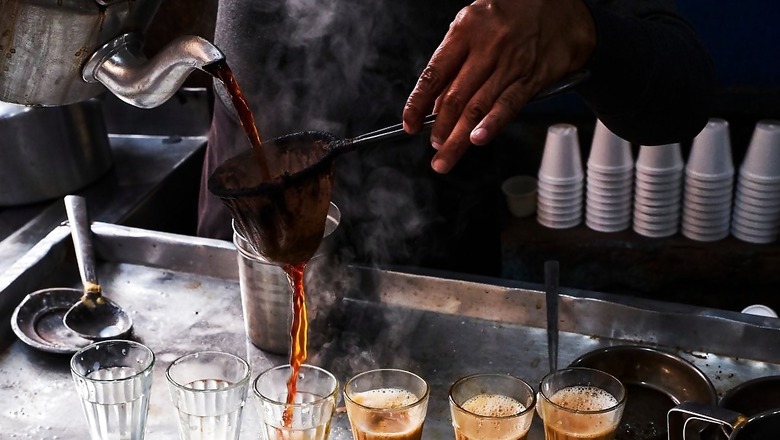
views
In many Indian households, enjoying a cup of chai alongside lunch is customary. Some individuals also opt for tea or coffee after meals, believing it aids in digestion or helps cleanse excessive oil from the throat and chest.
The revised dietary guidelines from the Indian Council of Medical Research (ICMR) have debunked the myths surrounding the consumption of tea or coffee before or after meals and explained why it’s not advisable.
According to the 148-page-long revised “Dietary Guidelines for Indians”, tannin is present in tea and coffee and is known to interfere with iron absorption. Hence, tea and coffee should be avoided “at least for one hour before and after meals”. Iron is an essential element for blood production, and about 70 per cent of your body’s iron is in the red blood cells called haemoglobin. When iron is not absorbed properly, its deficiency will lead to a fall in healthy red blood cells in the body, causing anaemia.
Also, for tea and coffee lovers, the guidelines throw light over an important point which says that the tea — green or black — is best when milk is not added.
“Tea contains theobromine and theophylline which are known to relax arteries and thereby promote blood circulation. They also contain flavonoids and other antioxidant polyphenols, which may reduce the risk of coronary heart disease and stomach cancer. These benefits can be best obtained if milk is not added to tea and if it is taken in moderation,” the guidelines, released last week, said.
Similar to tea and coffee, there are many other myths that the guidelines debunk.
Fresh fruit juice is superior to eating fruits: No, it’s not. Fresh fruit juices made from fruits like oranges, grapes, pineapple, apples and pomegranates provide vitamins (such as beta-carotene and vitamin C) and minerals such as potassium, calcium and more. However, the latest guidelines say, “they cannot be equated to whole fresh fruits which in addition to vitamins and minerals provide dietary fibre and should be preferred to fresh fruit juices…”
In essence, the guidelines highlight that while fresh fruit juices offer vitamins and minerals, they lack the dietary fibre found in whole fruits. Therefore, whole fruits are preferred over fruit juices.
Also, guidelines suggest that sugarcane juice — which is extensively consumed in India during summer — is high in sugar (containing 13-15 grams per 100ml) so its consumption should be minimised.
Coconut water can also harm: We believe that when it comes to natural purity and a universal remedy for many ailments, nothing compares to coconut water. However, the guidelines offer a warning.
While tender coconut water is a good hydrating beverage which contains several minerals, in patients prone to hyperkalemia (such as people with kidney diseases and heart diseases), coconut water should be avoided.
Hyperkalemia is the medical term that describes a situation where potassium level in your blood is higher than normal. Hence, coconut water cannot be taken by everyone.
Pink, black or white salt — all are the same: Nowadays, people are quitting white-coloured kitchen salt and adopting the usage of pink or black salt in an attempt to reduce salt consumption. The attempt is in the right direction as cutting down on salt, also known as sodium, can help lower your blood pressure and keep your heart healthy.
Rock salts are of two types — pink salt (sendha namak) and black salt (kala namak). “Pink and black salts can be easily distinguished by their colour, texture and smell. Pink salt is one of the purest forms of salt. Black salt, upon storage, grows darker. Assorted spices, charcoal, seeds and tree bark are used in the preservation of this salt,” the guidelines explain.
However, irrespective of the variety of salt, “their consumption should be limited as the sodium content in them is almost similar.” Hence, attempt to reduce salt, irrespective of its variety.
Exercise is good but talk to a doctor before you start: From the outset, we have been taught by textbooks, grandparents, and health advisors that regular physical activity, coupled with moderate exercise, is crucial for maintaining a healthy life.
The reason is simple — regular physical activity helps to maintain muscle mass, and bone density, maintains body weight, improves brain function and also reduces risk or progression of degenerative diseases.
Nevertheless, individual needs vary, and determining the appropriate amount and type of exercise should commence under the supervision of a qualified expert. Even activities commonly deemed beneficial can lead to harm if pursued excessively or without proper guidance. In the recent past, Indians have seen events where extreme physical exertion in terms of exercises and activities has led to harmful results.
https://www.news18.com/explainers/bengaluru-cyclists-death-sparks-concerns-experts-explain-how-excess-exercise-can-put-your-heart-at-risk-8769260.html
ICMR guidelines at every step mention that “exercise schedule should be decided in consultation with a physician”.
“Yoga, meditation and other indoor/outdoor physical exercises are advisable. If one follows a sedentary lifestyle, it is wise to consult a doctor before starting an exercise programme.”
It clarifies that exercise intensity and duration should be increased gradually over a period of time. Shortness of breath, pain, nausea, vomiting, and headache are warning signs that your body needs rest. “Men and women over 40 years of age should also consult a doctor or healthcare provider before starting a vigorous physical activity programme.”
Explore in-depth coverage of voting in Telangana , Odisha , and Andhra Pradesh during Lok Sabha Election 2024 Phase 4 polling.
















Comments
0 comment